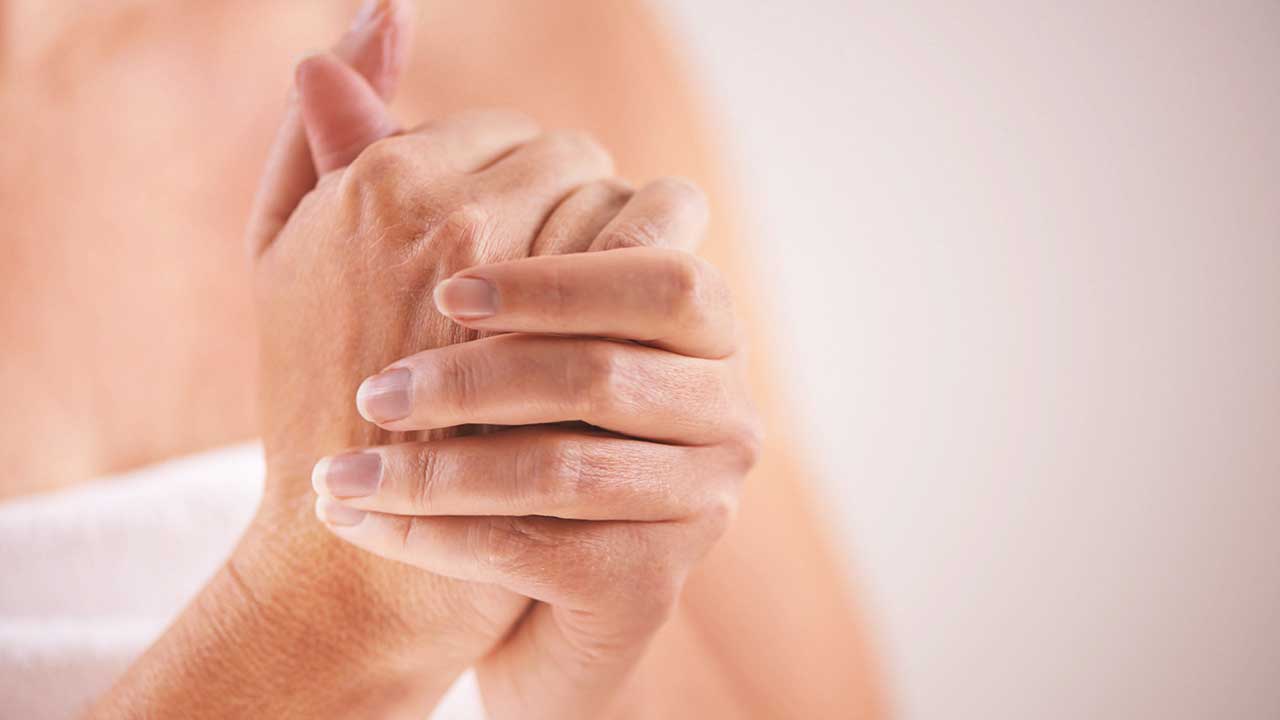
Psoriatic arthritis, or PsA, is best known for red, scaly skin patches and accompanying joint pain from inflammation. However, due to its underlying causes, PsA can cause a range of other symptoms you may not expect. This includes lower energy levels.
Fatigue is a common symptom of PsA, as well as other autoimmune diseases. In fact, as many as 50 percent of people with PsA experience moderate to severe fatigue.
Proper treatment for PsA can help reduce all accompanying symptoms, including low energy. There are also other energy-boosting steps you can take through diet and lifestyle changes. Be sure to discuss any new plans such as an exercise regimen with a doctor before getting started.
What causes fatigue in PsA
While pain and skin rashes are often the focus of PsA, fatigue is another of its most common symptoms. Fatigue is perhaps best described as ongoing tiredness and lack of energy despite getting sleep at night. You might find yourself too tired to complete everyday activities that you’re used to, or you may feel the need to take frequent naps during the day.
If you’re in constant joint pain and discomfort, your energy levels may eventually start to deplete. Your body instead spends its energy trying to alleviate pain, so you may not have as much energy to partake in your regular activities.
PsA can also directly affect energy in other ways. The inflammation related to this condition causes your body to release blood proteins called inflammatory cytokines. Upon the release of these proteins, you may become fatigued.
Lower energy levels may also have causes outside of PsA itself. For example, if joint pain keeps you up at night, you might develop a sleep deficit. Medications, such as corticosteroids, can cause insomnia, while NSAIDs, antidepressants, and blood pressure meds can cause fatigue. If you have depression or anxiety (related or unrelated to PsA), you may also have lower energy.
Treating the inflammation caused by PsA can help improve related symptoms. However, because the causes of fatigue in PsA are so complex, simply treating the condition as part of your regular treatment plan may not be enough.
Diet and exercise to boost energy
Your diet can play a significant role in your energy levels, so it’s important to focus on nutrient-packed whole foods. Whole grains, vegetables, and fruits are better choices than empty carbohydrates and packaged snacks, while fish and lean poultry are better than eating red meat every day. Depending on your overall health, you might consider enlisting a registered dietitian to help.
When you have both pain and low energy levels, exercise may be the last thing you want to do. However, regular physical activity can improve your overall symptoms by:
- increasing energy-inducing endorphins
- reducing inflammation
- increasing blood circulation
- keeping your joints conditioned (you may experience less pain over time)
- improving quality of sleep at night
If you haven’t exercised in a while because of your condition, it’s important that you talk to your doctor first. Walking and swimming are easier on the joints while still providing resistance and aerobic effects.
Start off slow, and gradually build the amount of time you exercise each day. If you don’t have the energy to invest in 30 minutes’ worth of exercise at a time, break this down into small segments throughout the day instead. Spreading activity throughout the day boosts your energy while also not spending it all on one workout.
Alternative strategies for PsA fatigue
Exercises that focus on deep breathing and meditation (such as tai chi and yoga) can also help beat PsA-related fatigue. These exercises help decrease stress while also activating energy throughout your body. Plus, you can reap the added benefit of flexibility, which improves joint health.
Though it may seem counterproductive, you’ll also want to take time to relax, especially near bedtime. Relaxing rituals such as reading, nighttime stretches, and warm baths can help calm your nervous system and get you in the mindset for rest. You’ll also want to try to go to bed and wake up in the morning at the same time. Yo-yo sleep schedules can increase daytime fatigue while also making it hard to fall asleep at night. Do your best to avoid napping during the day if you can.
Fighting fatigue for everyday energy
PsA treatment is the key to alleviating related symptoms of the condition, including those that interfere with your energy levels. Still, taking medications for PsA doesn’t always fully resolve problems with fatigue. Lifestyle changes are crucial for anyone looking to increase their energy, but PsA might require a little extra care. If you continue to have issues with low energy despite following your treatment plan, talk to your doctor about other measures that might help, such as short-term sleeping aids.
Finally, it’s also important to seek help when needed. If your fatigue is so bad you can’t perform everyday activities, enlist the help of friends and family. Self-care is essential with PsA so that you can feel like yourself and enjoy life to its fullest.
Read more in Moderate to Severe Psoriatic Arthritis Pain ResourcesDelzell, E. (2015, December 21). Fatigue and psoriatic arthritis. Retrieved from https://www.psoriasis.org/advance/fatigue-and-psoriatic-arthritis
Fatigue and arthritis. (n.d.). Retrieved from http://www.arthritis.org/living-with-arthritis/pain-management/fatigue/
Psoriatic arthritis. (n.d.). Retrieved from http://www.arthritis.org/about-arthritis/types/psoriatic-arthritis/ Why do I feel so tired? (n.d.). Retrieved from http://www.papaa.org/articles/why-do-i-feel-so-tired




Add a CommentComments
There are no comments yet. Be the first one and get the conversation started!